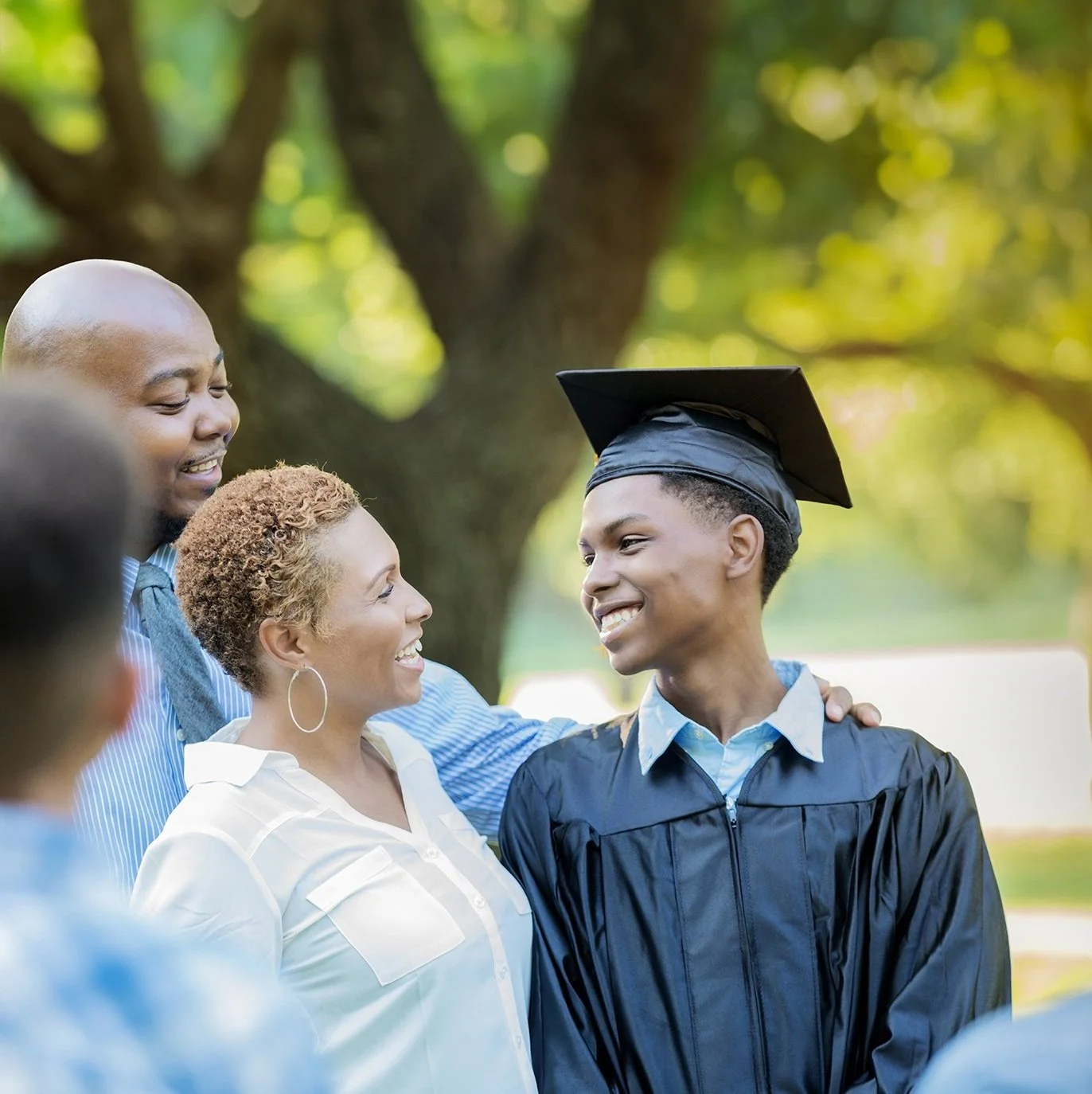
Packages for high school & college-bound audiences
Dr. Brenner offers tailored workshops and speaking engagements for high school and pre-college program students, parents and guardians, and high school and pre-college program faculty and staff. Bundle up to three presentations for various audiences during a one-day visit to your school or organization for a discount!
For High School and College-bound Parents and Guardians
These interactive talks and workshops are for 9–12th grade parents and guardians at meetings and assemblies focusing on college preparation. Talks and workshops may be customized for specific populations and needs (e.g. parents of seniors, first-gen families, parents of neurodivergent students).
-
Nothing in the college admissions process prepares high school graduates for the changes they will face as they transition from high school to living independently in college. Parents and guardians will finish this session with a complete list of the crucial life skills their college-bound students should master before leaving home, as well as tricks for teaching these skills. Topics include: physical and mental health; preparing to share a living space; personal safety; eating and sleeping routines; time and money management; campus resources; professional communication; and handling stress without the “scaffolding” of home.
-
There can be a considerable learning curve for parents who have helped support and advocate for their children for 18 years before being "kicked out" of the process. The college views your child as a capable young adult, but how do you learn to be their college parent? This session focuses on how parents can support their students as they become self-reliant and college-ready. Topics include: teaching teens to understand new responsibilities; preparing students for college academics; guiding their self-sufficient problem solving; and supporting them as they build resilience after challenges and setbacks.
-
Anticipating the shift from high school to college can feel overwhelming for many parents and teens. Neurodivergent teens and their families may face even more challenges in navigating this transition. This presentation will help parents and guardians approach the upcoming change as a gradual process, helping teens take charge of their academic and social lives and build the self-advocacy skills they need to become successful college students. Topics include: pivoting to the role of college parent; helping teens create a narrative about their specific learning needs; preparing students for college academic expectations; understanding the parent’s role when students apply for disability accommodations and other campus support; and moving from “fixer” to “supporter” as students learn to independently meet challenges and mistakes.
-
Visiting colleges with your teens takes money, time, and effort. Given this investment, it's important for families to be efficient and create meaningful experiences. From analyzing the first impressions of a campus to understanding which questions to ask a tour guide, this presentation will teach parents and guardians to thoughtfully research and organize their campus visits with their teens. Topics include: assessing the “fit” of each college; identifying and comparing campus cultures; exploring campus resources for first-year students; discovering off-campus amenities; and preparing to write college-specific application essays.
“Dr. Brenner's presentation in New Orleans was a huge success. Parents were thrilled to receive her insights into the college entry process. Her presentation style felt informal, encouraging questions and comments, while still offering a well-designed lecture that offered a wealth of information.”
Rachel Ruth, MSW
New Orleans Jewish Community Center
For High School Students & Pre-College Program Participants
These interactive talks and workshops are for 9–12th grade students and recent high school graduates, suited for college preparation programs, assemblies, and high school classrooms. Talks and workshops may be customized for specific populations and needs (e.g. members of National Honor Society, students in AP/IB courses, students in mentorship programs, neurodivergent students).
-
Nothing in the college admissions process prepares high school graduates for the changes they will face as they transition from high school to living independently in college. Students will gain a complete list of the life skills they should master before leaving home. Topics include: managing time and money; living with a roommate; communicating with peers across differences; taking charge of their own personal safety; using campus resources; speaking with professors; caring for their own physical and mental health; and handling stress without the “scaffolding” of home.
-
Studies show that many first-year students enter college unprepared for the many differences between high school- and college-level academic expectations. This presentation explains where new college students fail to thrive in the college classroom and how to prepare important academic skills before leaving home. Topics include: college-level coursework (different types of assignments and expectations for writing, reading, and evaluating ideas and sources); college-level professionalism (communicating with professors and staff in person, by email, phone, and videoconference); and college-level academic standards (time management, expectations for class participation, class preparation, and handling academic setbacks).
-
Retention rates are about making it through the first year of college, but we should be focused on students thriving, not just surviving! This presentation tackles four important and often overlooked themes in college preparation education: guiding students to take charge of their own health and wellness; assessing students’ academic and professional skills and assisting them in improving; helping students understand the benefits of asking questions and seeking help; and viewing mistakes as opportunities for growth.
“Dr. Brenner presented to our seniors about the sometimes fraught transition to college. The format was informative, interactive, and thought-provoking. Our students were impressed with Dr. Brenner's wisdom and depth of experience and left feeling more empowered to tackle this big life change!”
Dr. Reid Cottingham, Upper School Director
The Pingry School, Basking Ridge, NJ
For High School and Pre-College Program Faculty and Staff
These interactive talks and workshops are for faculty and staff working with 9–12th grade students and new high school graduates on their college preparation. Talks and workshops may be customized by grade level or for specific groups (e.g. college and career staff, English teachers, counselors).
-
A student’s high school education will undoubtedly serve as an excellent foundation for their college learning, but most high school graduates are unfamiliar with the surprising number of differences between high school and college academics. High school graduates who understand what’s expected of them in the college classroom set themselves up to thrive in their new environment. This interactive presentation includes useful information for high school and pre-college program faculty working with college-bound students. Topics include: varied types of college-level assignments; academic expectations for writing, reading, and evaluating ideas and sources; teaching time management skills; setting realistic expectations for class participation in college, and helping students take responsibility for academic setbacks.
-
In college, students are asked to engage with ideas and issues in a more complex manner than in high school. This is often called “higher-order critical thinking”—but what does this really mean and how can educators help students acquire these skills before college? This presentation will include tips for teaching students about what college professors expect of first-year students such as: selecting appropriate academic sources; analyzing, comparing, and evaluating ideas; moving from demonstrating comprehension to recommending original solutions; and crafting arguments to thoughtfully engage with college classroom discussions.
-
Colleges are witnessing a growing trend of underprepared first-year students who lack the social, emotional, and academic skills to thrive in their new environment. Yet colleges view incoming students as adults who must independently problem-solve; build resilience after setbacks; and handle stress without the “scaffolding” of home. In this workshop, high school faculty and staff will learn about current campus trends and common first-year challenges. Educators will learn how to incorporate college skill-building into their curriculum to better prepare their graduates for campus living.
“Andrea brings the same humane and emotionally intelligent touch to innovating and creating curriculum as she does to students, the faculty and staff she trains. I’ve never met anyone who gets the unique needs and psychology of students as well as Andrea does.”
Angie Chuang, Associate Chair of Undergraduate Studies & Associate Professor
University of Colorado






